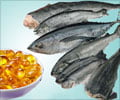Female promiscuity in fish leads to bigger and faster sperm, says an Australian researcher.
Female promiscuity has led to the development of bigger, faster sperm in fish, says an Australian researcher.
A team led by Dr John Fitzpatrick of the Centre for Evolutionary Biology, University of Western Australia, found that among monogamous cichlid species which share parental care and practise oral sex - fertilisation in the female fish's mouth - low sperm competition means the males have relatively small, slow sperm.But in polygamous species in which only the females care for offspring and which practise external fertilisation, where the sperm and ova mingle in the lake-water, sperm is bigger and faster.
Dr Fitzpatrick's research focuses on sexual selection, with particular emphasis on sperm competition, and the evolution of ejaculate traits in animals.
Hopefully further research will show which pressures have played a key role in the evolution of other species.
Dr.Fitzpatrick is now seeking to understand how inbreeding influences ejaculate traits and fertilisation success in guppies and Australian rainbowfish. Previously he examined how social status and sperm competition influences ejaculate traits in highly social species and species with alternative male reproductive tactics.
Cichlids belong to one of the largest vertebrate families and are a favourite subject for evolutionary biologists as they rapidly evolved into many closely related but diverse species.
"Our study shows how selection in the form of female mating behaviour may have acted in evolutionary time to shape various sperm traits and to produce superior ejaculates," Dr Fitzpatrick said. "Further use of this methodology in other animals can highlight the common selective pressures that have driven the evolution of ejaculate traits in animals in general."
The findings have been published in the US journal Proceedings of the National Academy of Science.
Source-Medindia
GPL/M













